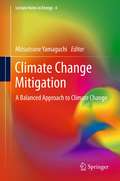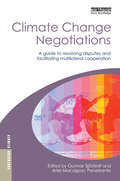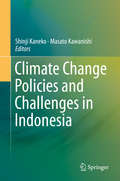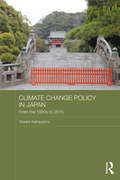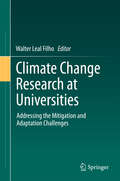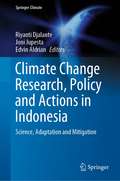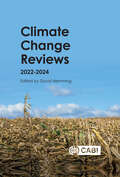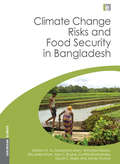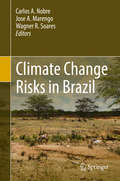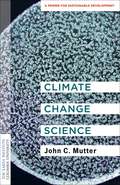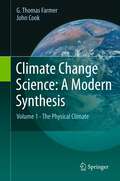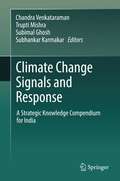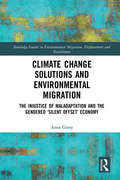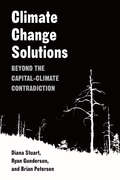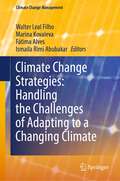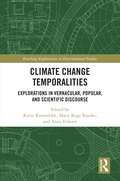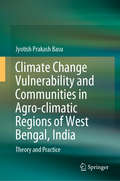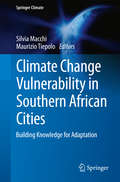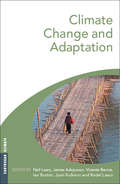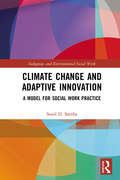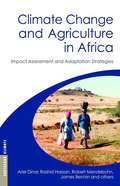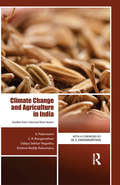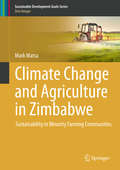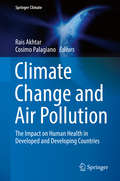- Table View
- List View
Climate Change Mitigation: A Balanced Approach to Climate Change (Lecture Notes in Energy #4)
by Mitsutsune YamaguchiClimate change is mainly caused by emissions of CO2 from burning fossil fuels, which provides over 85% of the world's energy. Strategies for mitigating climate change are connected with handling economic and social activities through their effects on the use of energy. Climate Change Mitigation investigates the costs of mitigation measures in comparison to their benefits, and compares the effects of implementing mitigation measures on various areas such as energy security and energy economy. "For 20 years, diplomats have struggled to make progress on climate change, mostly because global diplomacy is not well-linked to the realities of how nations and firms control emissions and adapt to the impacts of a changing climate. In this excellent book, Dr Yamaguchi has assembled experts to guide the redesign of global policy. The authors underscore how global warming efforts must resonate with other policy goals." David G. Victor, Director, Laboratory on International Law and Regulation and Professor, University of California San Diego "Climate Change Mitigation clarifies that climate change cannot be controlled by sacrificing economic growth or other global problems; however, action to control climate change cannot be delayed.Climate policy is pervasive and affects all dimensions of international policy;but it cannot be too ambitious: a balanced approach between mitigation and adaptation, economic growth and resource management, and short term development and long term investments, should be adopted. I recommend its reading." Carlo Carraro,President, Ca' Foscari University of Venice "The International Energy Agency estimates for every $1 of investment now toward sustainable energy, $4 of future spending can be saved. There is a business case for companies to reduce energy use. Companies in the energy and resource intensive industries must lead the way." Chad Holliday, Chairman. World Business Council for Sustainable Development and former Chair and CEO, DuPont
Climate Change Negotiations: A Guide to Resolving Disputes and Facilitating Multilateral Cooperation
by Gunnar Sjöstedt Ariel Macaspac PenetranteAs the Kyoto Protocol limps along without the participation of the US and Australia, on-going climate negotiations are plagued by competing national and business interests that are creating stumbling blocks to success. Climate Change Negotiations: A Guide to Resolving Disputes and Facilitating Multilateral Cooperation asks how these persistent obstacles can be down-scaled, approaching them from five professional perspectives: a top policy-maker, a senior negotiator, a leading scientist, an international lawyer, and a sociologist who is observing the process. The authors identify the major problems, including great power strategies (the EU, the US and Russia), leadership, the role of NGOs, capacity and knowledge-building, airline industry emissions, insurance and risk transfer instruments, problems of cost benefit analysis, the IPCC in the post-Kyoto situation, and verification and institutional design. A new key concept is introduced: strategic facilitation. 'Strategic facilitation' has a long time frame, a forward-looking orientation and aims to support the overall negotiation process rather than individual actors. This book is aimed at academics, university students and practitioners who are directly or indirectly engaged in the international climate negotiation as policy makers, diplomats or experts.
Climate Change Policies and Challenges in Indonesia
by Shinji Kaneko Masato KawanishiThis book demonstrates the challenges and opportunities of climate change actions in developing countries and primarily focuses on case studies in Indonesia, the world's fourth most populous country. The most important feature of the book is its examination of multiple facets of climate change issues in Indonesia, which allows readers to understand the complexity of climate change in developing countries: the synergies and trade-offs between different climate change actions as well as between climate and development priorities. Another unique feature is that it was jointly written by Indonesian and international authors, as well as by academics and development practitioners. This book addresses questions concerning mitigation measures in major sectors with original analyses of aspects including energy subsidies, sectoral energy efficiencies in manufacturing sectors, forest concessions, energy-saving labeling schemes, policy mixes for the urban transportation sector, and the introduction of waste-to-energy technologies. The book provides first-hand knowledge and data on energy and the institutional realities in Indonesia, which are not widely and readily available to an international audience. It offers a valuable reference guide for professionals working for governments and NGOs and donor agencies in the fields of climate change and development in developing countries. This work is also a valuable resource for undergraduate and graduate students of economics and environmental and development studies, in particular those who are interested in the synergies and conflicts between climate change and development.
Climate Change Policy in Japan: From the 1980s to 2015 (Routledge Studies in Asia and the Environment)
by Yasuko KameyamaAmidst growing environmental concerns worldwide, Japan is seen as particularly vulnerable to the effects of changing climate. This book considers Japan’s response to the climate change problem from the late 1980s up to the present day, assessing how the Japanese government’s policy-making process has developed over time. From the early days of climate change policy in Japan, through the United Nations Framework Convention on Climate Change conferences and Kyoto Protocol, right up to the 2015 negotiations, the book examines the environmental, economic, and political factors that have shaped policy. As the 2015 Conference of the Parties to the United Nations Framework Convention on Climate Change projects forward beyond 2020, the book concludes by analyzing how Japan has placed itself in the global climate change debate and how the country might and should respond to the problem in the future, based on the findings from accumulated history.
Climate Change Policy in North America
by A. Neil Craik Debora Van Nijnatten Isabel StuderWhile no supranational institutions exist to govern climate change in North America, a system of cooperation among a diverse range of actors and institutions is currently emerging. Given the range of interests that influence climate policy across political boundaries, can these distinct parts be integrated into a coherent, and ultimately resilient system of regional climate cooperation?Climate Change Policy in North America is the first book to examine how cooperation respecting climate change can emerge within decentralized governance arrangements. Leading scholars from a variety of disciplines provide in-depth case studies of climate cooperation initiatives - such as emissions trading, energy cooperation, climate finance, carbon accounting and international trade - as well as analysis of the institutional, political, and economic conditions that influence climate policy integration.
Climate Change Research at Universities: Addressing the Mitigation and Adaptation Challenges
by Walter Leal FilhoThis unique book provides a multidisciplinary review of current, climate-change research projects at universities around the globe, offering perspectives from all of the natural and social sciences. Numerous universities worldwide pursue state-of-the-art research on climate change, focussing on mitigation of its effects as well as human adaptation to it. However, the 2015 Paris 21st Conference of the Parties of the United Nations Framework Convention on Climate Change (UNFCCC) (COP 21)" demonstrated that there is still much room for improvement in the role played by universities in international negotiations and decision-making on climate change. To date, few scientific meetings have provided multidisciplinary perspectives on climate change in which researchers across the natural and social sciences could come together to exchange research findings and discuss methods relating to climate change mitigation and adaption studies. As a result the published literature has also lacked a broad perspective. This book fills that gap and is of interest to all researchers and policy-makers concerned with global climate change regardless of their area of expertise.
Climate Change Research, Policy and Actions in Indonesia: Science, Adaptation and Mitigation (Springer Climate)
by Joni Jupesta Riyanti Djalante Edvin AldrianThis edited volume reviews the latest advances in policies and actions in understanding the science, impacts and management of climate change in Indonesia. Indonesia is one of the most vulnerable countries to climate change due to its geographical, physical, and social-economic situations. There are many initiatives to understand and deal with the impacts in the country. The national government has issued key guiding policies for climate change. International agencies together with local stakeholders are working on strengthening the capacity in the policy formulations and implement actions to build community resilience. Universities are conducting research on climate change related at different scales. Cities and local governments are implementing innovations in adapting to the impacts of climate change and transiting toward green economy. This book summarizes and discusses the state-of-the-art regarding climate change in Indonesia including adaptation and mitigation measures. The primary readership of the book includes policy makers, scientists and practitioners of climate change actions in Indonesia and other countries facing similar challenges.
Climate Change Reviews: 2022-2024
by David HemmingClimate change is a reality that affects all aspects of agriculture, and is also impacted by agriculture. This collection of articles looks at a range of topics including: Impact on pollinators, key crops, farming systems, animal welfare and on humans, role of farmer organisations in extending use of climate-smart practices, genetic resources able to cope with climate change, including wild relatives and breeding for improved tolerance, how rhizobacteria can improve resilience, mitigation of livestock greenhouse gas emissions and the push for climate neutrality in the dairy industry and carbon storage in grasslands and seaweed. These articles have been published in the journal CABI Reviews.
Climate Change Risks and Food Security in Bangladesh (Earthscan Climate)
by Cynthia Rosenzweig Mozaharul Alam James Thurlow Winston Yu Ahmadul Hassan Abu Saleh Khan Alex Ruane David MajorManaging climate variability and change remains a key development and food security issue in Bangladesh. Despite significant investments, floods, droughts, and cyclones during the last two decades continue to cause extensive economic damage and impair livelihoods. Climate change will pose additional risks to ongoing efforts to reduce poverty. This book examines the implications of climate change on food security in Bangladesh and identifies adaptation measures in the agriculture sector using a comprehensive integrated framework. First, the most recent science available is used to characterize current climate and hydrology and its potential changes. Second, country-specific survey and biophysical data is used to derive more realistic and accurate agricultural impact functions and simulations. A range of climate risks (i.e. warmer temperatures, higher carbon dioxide concentrations, changing characteristics of floods, droughts and potential sea level rise) is considered to gain a more complete picture of potential agriculture impacts. Third, while estimating changes in production is important, economic responses may to some degree buffer against the physical losses predicted, and an assessment is made of these. Food security is dependent not only on production, but also future food requirements, income levels and commodity prices. Finally, adaptation possibilities are identified for the sector. This book is the first to combine these multiple disciplines and analytical procedures to comprehensively address these impacts. The framework will serve as a useful guide to design policy intervention strategies and investments in adaptation measures.
Climate Change Risks in Brazil
by Carlos A. Nobre Jose A. Marengo Wagner R. SoaresThis book maps extreme temperature increase under dangerous climate change scenarios in Brazil and their impacts on four key sectors: agriculture, health, biodiversity and energy. The book draws on a careful review of the literature and climate projections, including relative risk estimates. This synthesis summarizes the state-of-the-art knowledge and provides decision-makers with risk analysis tools, to be incorporated in public planning policy, in order to understand climate events which may occur and which may have significant consequences.
Climate Change Science: A Primer for Sustainable Development (Columbia University Earth Institute Sustainability Primers)
by Dr. John C. MutterHow will future climates be different from today’s world—and what consequences will changes in climate have for societies and their development strategies? This book is a primer on the essential science for grasping the workings of climate change and climate prediction. It is accessible for readers with little to no background in science, with an emphasis on the needs of those studying sustainable development.John C. Mutter gives a just-the-facts overview of how the climate system functions and what we know about why changes occur. He recounts the evolution of climatology from the earliest discoveries about Earth’s climate to present-day predictive capabilities, and clearly presents the scientific basis of fundamental topics such as climate zones, ocean-atmosphere dynamics, and the long-term cycles from glacial to interglacial periods. Mutter also details the mechanisms of climate change and the ways in which human activity affects global climate. He explains the science behind some known consequences of rising temperatures, such as sea level rise, hurricane behavior, and climate variability. The primer discusses how climate predictions are made and examines the sources of uncertainty in forecasting. Climate Change Science is a straightforward and easy-to-read treatment of the fundamental science needed to comprehend one of today’s most important issues.
Climate Change Science: Volume 1 - The Physical Climate
by John Cook G. Thomas FarmerAn introduction to the principles of climate change science with an emphasis on the empirical evidence for climate change and a warming world. Additional readings are given at the end of each chapter. A list of "Things to Know" opens each chapter. Chapters are arranged so that the student is first introduced to the scientific method(s), examples of the use of the scientific method from other sciences drawn from the history of science with an emphasis on climate science. Climate science is treated in each chapter based on the premise of global warming. Chapter treatments on the atmosphere. biosphere, geosphere, hydrosphere, and anthroposphere and their inter-relationships are given.
Climate Change Signals and Response: A Strategic Knowledge Compendium for India
by Chandra Venkataraman Trupti Mishra Subimal Ghosh Subhankar KarmakarThis book provides a synthesis of research findings, in terms of strategic knowledge outcomes regarding emergence of recent regional climate signals, implications for impacts assessment, and mitigation and adaptation response, relevant in the Indian context. The first part discusses evidence of climate change and its underlying scientific processes across India, chiefly focusing on impacts that are already visible and attributable to anthropogenic activities. The latter part deals with the responses to climate change, highlighting the mitigation and adaptation strategies in various sectors and communities.The book presents a concise interpretation, distilling practical recommendations and policy prescriptions at national and sub-national levels. It serves as a reference point for understanding scientific advances and persisting uncertainty, future vulnerability and response capacity of interlinked human and natural systems, pertaining to India. It is an excellent resource for policy makers and industry watchers in addition to the research fraternity.
Climate Change Solutions and Environmental Migration: The Injustice of Maladaptation and the Gendered 'Silent Offset' Economy (Routledge Studies in Environmental Migration, Displacement and Resettlement)
by Anna GintyThis book lifts the taboo on maladaptation, a different driver of environmentally induced migration, which shines a light on the negative consequences arising from the solutions to climate change, adaptation and mitigation policies. Through a systematic analysis and critique of existing mitigation and adaptation polices under the United Nations Framework Convention on Climate Change (UNFCCC) and international development community, and supplemented by a small empirical study in Indonesia, this book catalogues how maladaptation is manufactured under existing climate change solutions. It posits that customary communities in general- and women in particular- are disproportionately affected by the dominant market-driven logics that underscore current climate change solutions adopted by the UNFCCC. The injustice of maladaptation is highlighted as multi-faceted and explored using political, economic, social and ecological lenses, and the concept of environmental reintegration is also explored as a possible solution to this issue. Further possibilities are then presented in the Afterword, as a combination of what the new (post-neoliberalism) conjuncture could potentially look like. This volume will be of great interest to students, scholars and practitioners of climate change, environmental policy, environmental migration and displacement, development studies, I/NGOs and civil society actors and activists more broadly.
Climate Change Solutions: Beyond the Capital-Climate Contradiction
by Diana Stuart Ryan Gunderson Brian PetersenClimate Change Solutions represents an application of critical theory to examine proposed solutions to climate change. Drawing from Marx’s negative conception of ideology, the authors illustrate how ideology continues to conceal the capital-climate contradiction or the fundamental incompatibility between growth-dependent capitalism and effectively and justly mitigating climate change. Dominant solutions to climate change that offer minor changes to the current system fail to address this contradiction. However, alternatives like degrowth involve a shift in priorities and power relations and can offer new systemic arrangements that confront and move beyond the capital-climate contradiction. While there are clear barriers to a systemic transition that prioritizes social and ecological well-being, such a transition is possible and desirable.
Climate Change Strategies: Handling the Challenges of Adapting to a Changing Climate (Climate Change Management)
by Walter Leal Filho Marina Kovaleva Fátima Alves Ismaila Rimi AbubakarThis book includes information, experiences, practical initiatives and projects around the subject matter and makes it available to a wide audience. It addresses the scientific, social, political and cultural aspects of climate change impacts and respective solutions in an integrated and coherent way.Climate change as a global phenomenon imposes new challenges for survival. Extreme weather events including heat waves, storms, droughts as well as rising sea levels, warming oceans and melting glaciers threaten people's livelihoods and communities, ecosystems and habitats. Furthermore, it affects the entire food chain and increases competition for natural resources fuelling socioeconomic tensions. The results of the latest IPCC report highlight the urgent need for combating climate change. The adaptation measures to be undertaken range across sectors, thematic fields and geographical locations.Based on this need, the book focuses on the high-quality, interdisciplinary contributions on the scientific, social, economic, political and cultural aspects of climate change challenges and solutions
Climate Change Temporalities: Explorations in Vernacular, Popular, and Scientific Discourse (Routledge Explorations in Environmental Studies)
by Kyrre Kverndokk, Marit Ruge Bjærke, and Anne EriksenClimate Change Temporalities explores how various timescales, timespans, intervals, rhythms, cycles, and changes in acceleration are at play in climate change discourses. It argues that nuanced, detailed, and specific understandings and concepts are required to handle the challenges of a climatically changed world, politically and socially as well as scientifically. Rather than reflecting abstractly on theories of temporality, this edited collection explores a variety of timescales and temporalities from narratives, experience, popular culture, and everyday life in addition to science and history - and the entanglements between them. The chapters are clustered into three main sections, exploring a range of genres, such as questionnaires, interviews, magazines, news media, television series, aquariums, and popular science books to critically examine how and where climate change understandings are formed. The book also includes chapters historising notions of climate and temporality by exploring scientific debates and practices. Climate Change Temporalities will be of great interest to students and scholars of humanistic climate change research, environmental humanities, studies of temporality and historicity, cultural studies, cultural history, and popular culture.
Climate Change Vulnerability and Communities in Agro-climatic Regions of West Bengal, India: Theory and Practice
by Jyotish Prakash BasuThis book addresses the quantitative measurement of climate change vulnerability at the macro and micro-level and identifies household adaptation strategies to cope with the adverse effects of climate change. Focusing on five different agro-climatic regions of West Bengal: the hill region, foothill region, drought region, and coastal regions of Sunderban and Purba Midnapore, it presents research related to various sectors, including the agricultural, forestry and informal sectors. The book also offers insights into the impact of climate change on smallholdings, forest-dependent communities, fishing and crab collecting communities, casual labourers and workers in the informal sectors, and identifies the key vulnerabilities associated with climate change, as well as the causes of such vulnerability the extent to which remedial measures have been taken. The book particularly highlights the role of Indian governmental policies like Sarva Shiksa Abhiyan, Mahatma Gandhi National Rural Employment Guarantee Act (MGNREGA), the housing scheme, Indira Awas Yojana, the Food for Work Programme, and the rural road building scheme, Pradhan Mantri Grameen Sadak Yojana, which are important for rural development and in reducing vulnerability. Showcasing vulnerability measurement in the socio-ecological system, the book will appeal to developmental practitioners, government implementation agencies, policymakers and researchers in the field of environmental science and policymakers will find this book appealing.
Climate Change Vulnerability in Southern African Cities: Building Knowledge for Adaptation (Springer Climate)
by Silvia Macchi Maurizio TiepoloIn recent decades, extreme rains and drought have struck urban regions in Africa like never before. Nevertheless, limited information is available on which to base development of early warning systems, identification of high-risk zones and formulation of local action plans. This book is about how to build the knowledge necessary for planning adaptation to climate change in Sub-Saharan cities. It brings together lessons learned from international development actions conducted by a number of scholars in disciplines ranging from meteorology and hydrogeology to urban planning and environmental management. Selected methods to assess the impacts of extreme weather and ecological stress are presented along with possible approaches to improve the adaptive capacity of Sub-Saharan cities through institutional measures at the local government level. The book is addressed to graduate students, researchers and practitioners interested in enhancing their knowledge and skills in order to integrate climate change into applied research and development projects in urban Africa.
Climate Change and Adaptation (Earthscan Climate Ser.)
by Vicente Barros Ian Burton Jyoti Kulkarni Neil Leary James Adejuwon Rodel Lasco�This book provides valuable lessons that will improve public policy and the quality of decisions that will affect generations to come.� Richard Moss, Senior Director Climate and Energy, United Nations Foundation �An excellent addition to the body of knowledge on adaptation to climate change from the developing world, which has been largely missing until now.� Saleemul Huq, Director, Climate Change Programme, International Institute for Environment and Development �This important volume is a valuable effort on adaptation to climate change that needs to be on the desks of those seeking coping strategies for longer term responses to evolving climate changes.� Roger Kasperson, Emeritus, Clark University, USA The IPCC, winner of the Nobel Peace Prize for 2007, makes clear that while climate change mitigation is vital, the world must also begin to adapt. But how best can this be achieved? This authoritative volume (along with its companion on vulnerability), resulting from the work of the Assessments of Impacts and Adaptations to Climate Change (AIACC) project launched with the IPCC in 2002, is the first to provide an in-depth investigation of the stakes in developing countries. It covers current practices for managing climate risks, deficits between current practices and needs, the changing nature of the risks due to human caused climate change, strategies for adapting to changing risks, and the need to integrate these strategies into development planning and resource management. The book also identifies obstacles to effective adaptation and explores measures needed to create conditions that are favourable to climate change adaptation. Published with TWAS and START
Climate Change and Adaptive Innovation: A Model for Social Work Practice (Indigenous and Environmental Social Work)
by Sunil D. SanthaThe world is witnessing climate change. As responsible citizens of planet earth, we can actively participate in the co-creation of actionable knowledge and solutions. There may not be a single and linear pathway to adaptation anymore. This book explores multiple and iterative pathways of adapting to climate change and its impacts. Climate Change and Adaptive Innovation introduces an adaptive innovation model that has its premise on core values of justice, care and solidarity. Navigating collectively through shared conversations and dialogic processes, this model showcases how we could embark on an enduring journey where diverse actors could collaboratively make informed choices and take necessary actions to enhance the safety and security of their lived environment. Rooted in action research, it is envisaged that this model could enable us to facilitate the designing and implementation of people-centred ethical adaptation projects. This book will be of interest to social workers, social scientists and development practitioners who are engaged in the field of climate justice, adaptation, social innovation and sustainable livelihoods. Social work educators and students will certainly draw inspiration from the stories that are shared in this book. It will further motivate many transdisciplinary professionals to engage with action research as a method of innovation, reflection and practice
Climate Change and Agriculture in Africa: Impact Assessment and Adaptation Strategies (Earthscan Climate)
by Ariel Dinar Robert Mendelsohn Rashid Hassan James Benhin et al'This is a well researched, thorough and impressive work on climate change and agriculture in Africa. I recommend it to students, researchers and practitioners working on climate change issues' Jabavu Clifford Nkomo, senior programme specialist, IDRC This landmark book encompasses a comprehensive assessment of the potential economic impacts of future climate change, and the value of adaptation measures in Africa for different zones, regions, countries and farm types. Researchers developed and applied multiple analytical procedures to assess quantitatively how climate affects current agricultural systems in Africa, enabling them to predict how these systems may be affected in the future by climate change under various global warming scenarios, and suggesting what role adaptation could play. The study is the first to combine spatially referenced household survey data with climatic data at both national and international levels. This book provides vital knowledge about the impacts of climate change on Africa, serving as a guide to policy intervention strategies and investment in adaptation measures. It makes a major contribution to the analysis of climate change impacts and developing adaptation strategies, especially in the highly vulnerable farming communities in the developing world. Published with CEEPA and supported by the World Bank.
Climate Change and Agriculture in India: Studies from Selected River Basins
by Udaya Sekhar Nagothu K. Palanisami Krishna Reddy Kakumanu C. R. RanganathanThis book provides an overview of climate change in India using river basin data and analytical and econometric methods. It, first, makes a quantitative assessment of how climate change affects agricultural and food production systems; second, predicts how these systems may respond to climate change; and third, suggests adaptation measures and strategies to improve the income of farmers, increase production, save water and conserve environment.The work will be greatly useful to policy-makers, researchers and teachers of agricultural economics, environmental studies and economics and development studies as also to research organizations dealing with climate modelling and resource management.
Climate Change and Agriculture in Zimbabwe: Sustainability in Minority Farming Communities (Sustainable Development Goals Series)
by Mark MatsaThis book proves, through empirical research, that indigenous and traditional agricultural communities have experienced severe climate change impacts, and have developed corresponding livelihood strategies to strengthen their resilience in a variable climate. With a focus on indigenous minority farming communities in the developing region of South-Western Zimbabwe, the study presents both qualitative and quantitative approaches of data analysis to assess sustainability problems amid climate change and climate variability challenges, and proposes potential solutions. In eight chapters, the book expands on the scarce availability of community-based research on climate change and variability in Zimbabwe.The book is meant for college and university students and stakeholders involved in development work in rural minority farmer communities, especially in climate change prone regions of Africa and other developing countries who have very few options of adaptation and mitigation.
Climate Change and Air Pollution: The Impact on Human Health in Developed and Developing Countries (Springer Climate)
by Rais Akhtar Cosimo PalagianoThis book discusses regional and international climate-change, air- pollution and human-health scenarios. The research, from both industrialized and developing countries, focuses on region-specific perspectives of climate change impacts on air pollution. After analyzing the variations of climate data over recent decades, the authors consider the different effects of climate change on air pollution and health. As stressed by the IPCC, "pollen, smoke and ozone levels are likely to increase in a warming world, affecting the health of residents of major cities. Rising temperatures will worsen air quality through a combination of more ozone in cities, bigger wild fires and worse pollen outbreaks," according to a major UN climate report. The report follows the World Health Organization in finding that air pollution is the world's greatest environmental health risk, killing 7 million people in 2014 (compared to 0. 4 million deaths due to malaria). Deteriorating air quality will most affect the elderly, children, people with chronic ill-health and expectant mothers. Another report suggests that more than 5. 5 million people die prematurely each year due to air pollution with over half of those deaths occurring in China and India. A study on the air pollution in the USA,suggests that more than half of US population lives in areas with potentially dangerous air pollution, and about six out of 10 of the top cities for air pollution in the USA are located in the state of California. In the face of future climate change, scientists have urged stronger emission controls to avoid worsening air pollution and the associated exacerbation of health problems, especially in more populated regions of the world. It is hoped that the implementation of the Paris Climate Agreement will help minimize air pollution. Additionally the authors consider the various measures that different countries and groups of countries, like the European Union, have adopted to mitigate the problems arising from climate change and to safeguard the health of population. The book examines the increasing incidence of diseases largely caused by climate change. The countries/regions covered in this study include the USA, Northern Europe (U. K). ,Southern Europe ( Italy), Canada, Australia, East Asia, Russia, Hong Kong, Taiwan, Thailand, Malaysia, Indonesia, India, South Africa, Mexico, Brazil, Caribbean countries, and Argentina.
